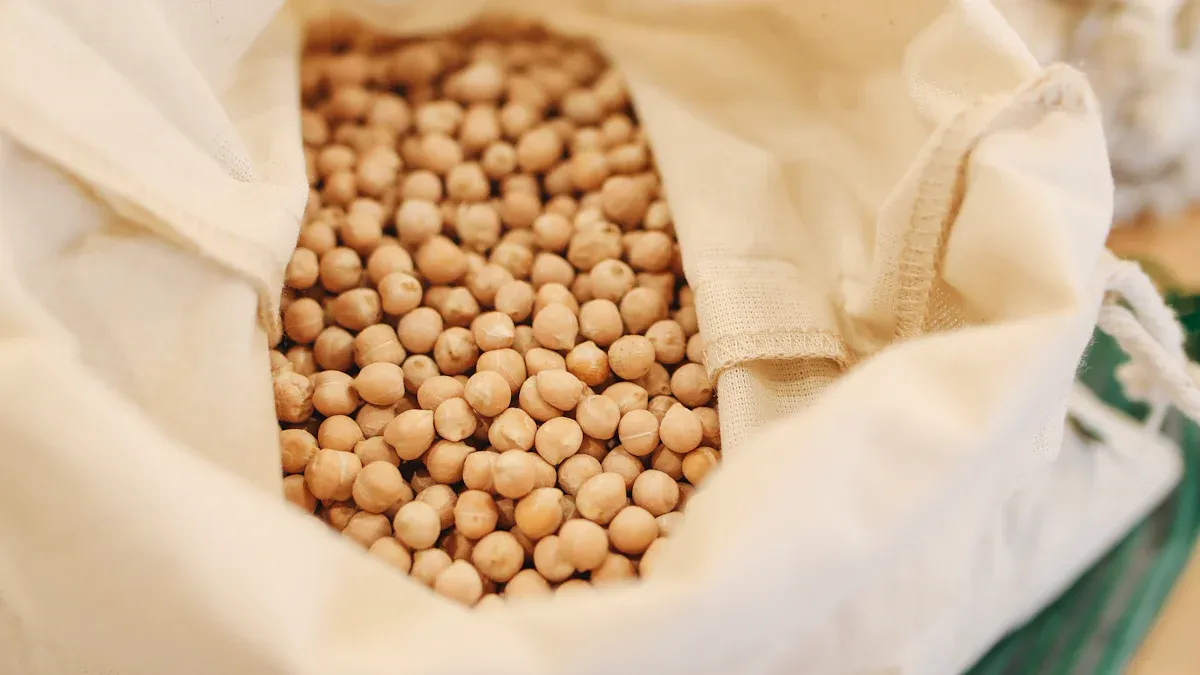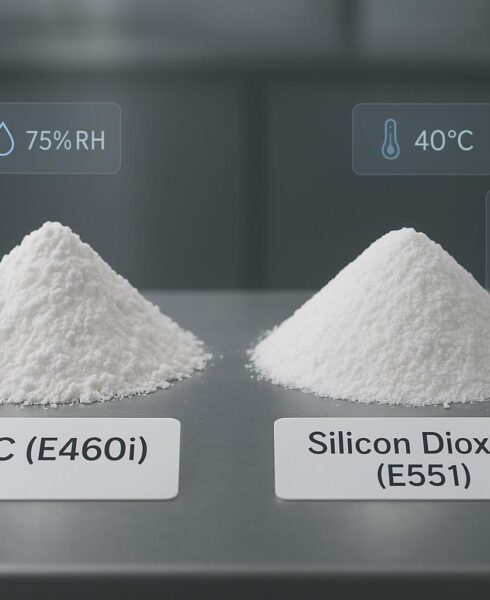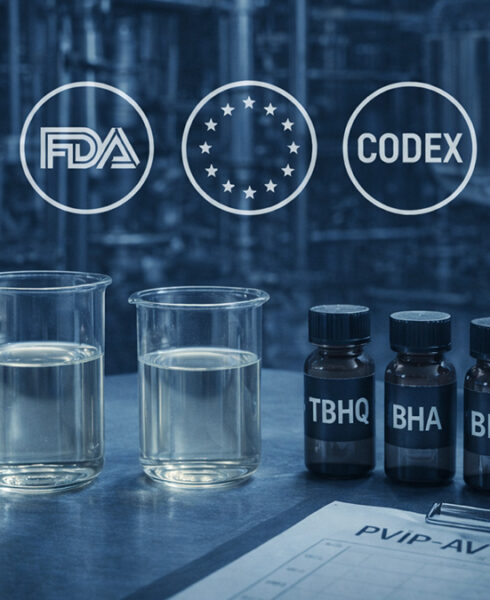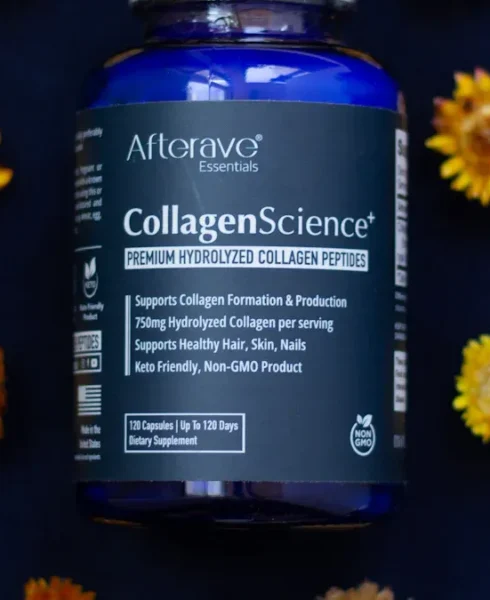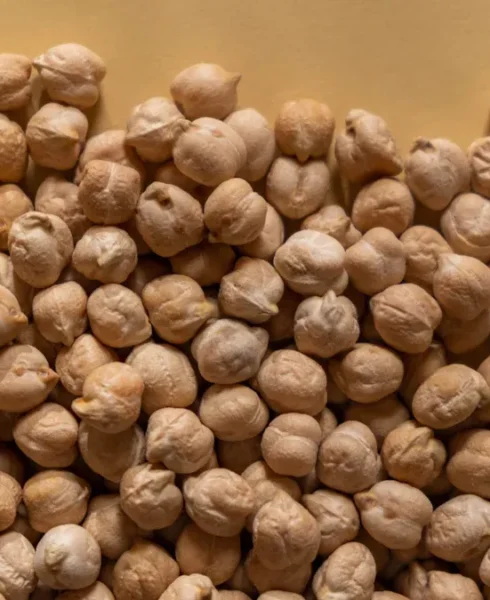Soy protein isolate peptides are short chains of amino acids. They come from soy protein isolate. These peptides are part of a group called bioactive peptides. You can find them in foods and supplements. These help support your health. Studies show soy protein isolate peptides may help with weight control. They may support your heart. They may protect against some diseases. More people are choosing plant-based diets. The market for these ingredients keeps growing.
Attribute | Value |
|---|---|
Market Size Value In 2024 | |
Revenue Forecast In 2034 | USD 166.94 Billion |
Growth Rate CAGR | 9.9% from 2025 to 2034 |
Key Takeaways
Soy protein isolate peptides are tiny pieces of protein. They can help you stay healthy. They help with weight control. They are good for your heart. They protect you from some diseases.
These peptides can lower blood pressure. They can also lower cholesterol. They do not cause the side effects that some medicines do. This makes them a safe choice.
You can find soy protein isolate peptides in many foods. They are in snack bars. They are in smoothies. They are in dairy alternatives. Eating these foods can help you get more nutrients.
More people want plant-based proteins now. People want foods that are healthy and natural. This makes soy protein isolate very popular.
Scientists keep finding new benefits of soy protein isolate peptides. They may help your muscles recover. They may help your immune system. They may also have antioxidant properties.
From Soy Protein to Peptides
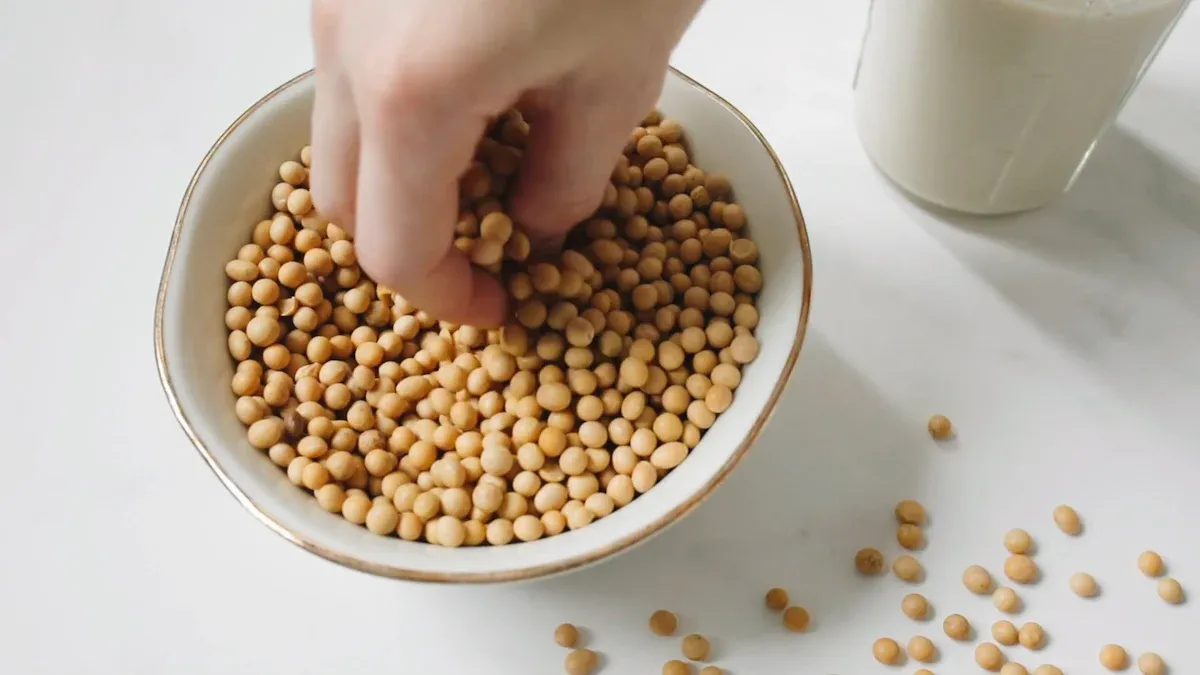
What Is Soy Protein Isolate?
You might ask why soy protein isolate is important. It comes from soybeans. Makers use wet fractionation to take out most fat and carbs. This makes a powder with over 90% protein. The powder is easy to digest. You can mix it into many foods.
Here is a table that shows how soy protein isolate compares to other plant proteins:
Type of Protein Ingredient | Protein Content (%) | Extraction Method | Functional Properties |
|---|---|---|---|
Soy Protein Isolate | >90 | Wet fractionation | High functionality |
Soy Protein Concentrate | 65-90 | Dry/Wet fractionation | Moderate functionality |
Protein-Rich Flours | 50-65 | Various methods | Lower functionality |
Other Plant Proteins | Varies | Varies | Varies |
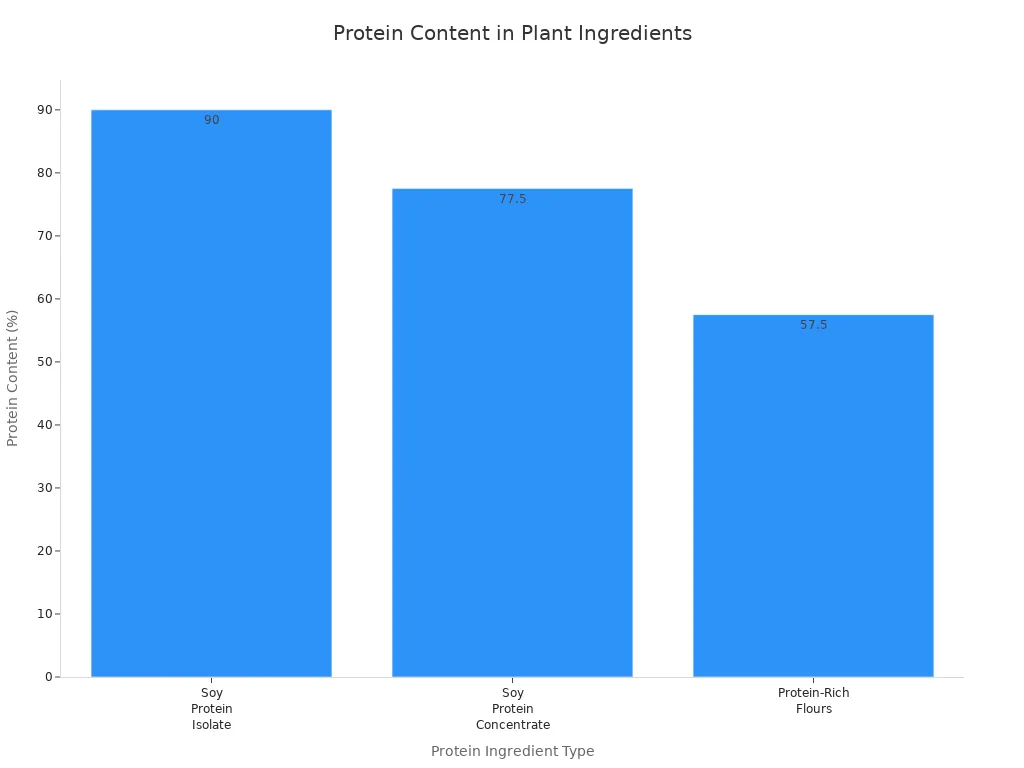
What Are Bioactive Peptides?
Bioactive peptides are short chains made of amino acids. They are inside proteins like soy protein isolate. When you break down these proteins, bioactive peptides come out. These small parts can help your body in many ways.
Some bioactive peptides from soy protein have special shapes. Scientists saw that high-pressure processing changes their shape. For example, α-helix and β-sheet amounts go down. β-turn and random coil amounts go up. These changes can make the peptides work better in your body.
Bioactive peptides help make foods thicker and more stable.
Their shape connects to health benefits.
Some bioactive peptides help your immune system and show strong effects.
Why Soy Isolate Is a Top Source
Soy protein isolate peptides are in many soy foods. Soy protein isolate is special because it has lots of protein and works well in foods. You get more bioactive peptides from soy protein isolate than from other plant proteins.
People want to eat healthier foods. You see more plant proteins in stores now. In Europe, almost half of families buy plant-based milk. In the U.S., more than half of people want foods with fewer steps in making. The world soybean market keeps getting bigger, and peptide products are rising fast.
Soy protein isolate peptides let you get the good things from bioactive peptides in foods, drinks, and supplements.
Production Methods
Enzymatic Hydrolysis
Enzymatic hydrolysis breaks soy protein into smaller, active peptides. Special enzymes cut the protein chains in certain places. The enzyme you pick changes how many peptides you get. It also changes what kinds of peptides you get. Some enzymes do a better job than others. Here is a table that lists common enzymes and what they do:
Enzyme | Effect on Peptide Yield and Activity |
|---|---|
Alcalase | |
Trypsin | |
Pepsin | Influences quality and quantity of hydrolysate |
Papain | Influences quality and quantity of hydrolysate |
Bromelain | Influences quality and quantity of hydrolysate |
Neutral Protease | Influences quality and quantity of hydrolysate |
Complex Protease | Influences quality and quantity of hydrolysate |
Alcalase makes the most peptides from soy protein. Trypsin and other enzymes help make different bioactive peptides.
Fermentation
Fermentation uses good microbes to break down soy protein. You can use bacteria like lactic acid bacteria or Bacillus strains. These microbes make their own enzymes. They create a mix of peptides with many sizes and shapes. This way often costs less than using only pure enzymes.
Fermentation gives many kinds of bioactive peptides.
You get more natural flavors and fewer allergies.
The process uses safe, food-grade microbes.
Fermentation can make soy protein healthier by making new peptides that help your body.
Advanced Processing
Advanced processing helps make soy protein peptides for products. After hydrolysis or fermentation, you can use ultrafiltration to sort peptides by size. Spray-drying or encapsulation turns the peptides into powders or capsules. The enzyme and steps you use change how well the peptides work. Peptides made with Alcalase or trypsin often work better than those made with other enzymes. These methods help you get good peptides for foods, drinks, and supplements.
Health Benefits of Soy Protein Isolate Peptides

Antihypertensive Effects
Bioactive peptides from soy protein isolate peptides help your heart. They can lower blood pressure. These peptides block the angiotensin-converting enzyme (ACE). They also work with the renin-angiotensin system. This helps your blood vessels relax. Your blood pressure stays in a healthy range.
Many studies show these peptides work well for blood pressure:
One study had 40 people drink soy milk or cow’s milk. After three months, the soy milk group had lower blood pressure.
Sagara and his team studied 61 men. They ate 20 grams of soy protein and 80 mg of isoflavones daily for five weeks. Their blood pressure went down.
The Shanghai Women’s Health Study followed over 45,000 women. Women who ate 25 grams of soy protein each day had lower blood pressure.
In China, 302 people took 40 grams of isolated soybean protein every day for 12 weeks. Their blood pressure dropped.
Bioactive peptides from soy-based foods are a safe way to manage blood pressure. They do not cause the side effects that some medicines do.
Antioxidant Properties
Bioactive peptides from soy protein isolate peptides protect your cells. They act as antioxidants. These peptides fight free radicals. They help your body stay healthy. Scientists tested these effects in labs and animals.
Study Type | Findings |
|---|---|
In vitro | Soybean fermentation extract had strong antioxidant activity. |
In vivo | B. subtilis natto fermented soy protein isolate protected against damage. |
In vitro | Three antioxidant peptides were found in soy protein isolate. DHHDPIMPYL worked best. |
Mechanism | Peptides kept cells balanced by removing ROS and helping glutathione peroxidase. |
In vitro | Hydrolysis was improved to get SPI hydrolysates with high antioxidant activity. |
Peptide | DHHDPIMPYL had strong antioxidant activity and special sites for action. |
These peptides help your body stay balanced. They support your cells and may slow aging. You can find them in many plant-based proteins and soy foods.
Anti-Inflammatory and Immune Support
Bioactive peptides from soy protein isolate peptides help your immune system. They can lower inflammation and make your body stronger. Scientists tested these effects in labs.
Treatment | Effect on Phagocytosis | Induction of M1/M2 Polarization |
|---|---|---|
Pepsin-ISPH4h | No induction | |
1P | Raised | No induction |
Treatment (μg protein/mL) | IL-10 Levels (pg/mL) at 8h | IL-10 Levels (pg/mL) at 16h |
|---|---|---|
0.5 | Not significant | Not significant |
2.5 | Not significant | Not significant |
7.5 | 642.2 | |
15 | 577.24 | 956.0 |
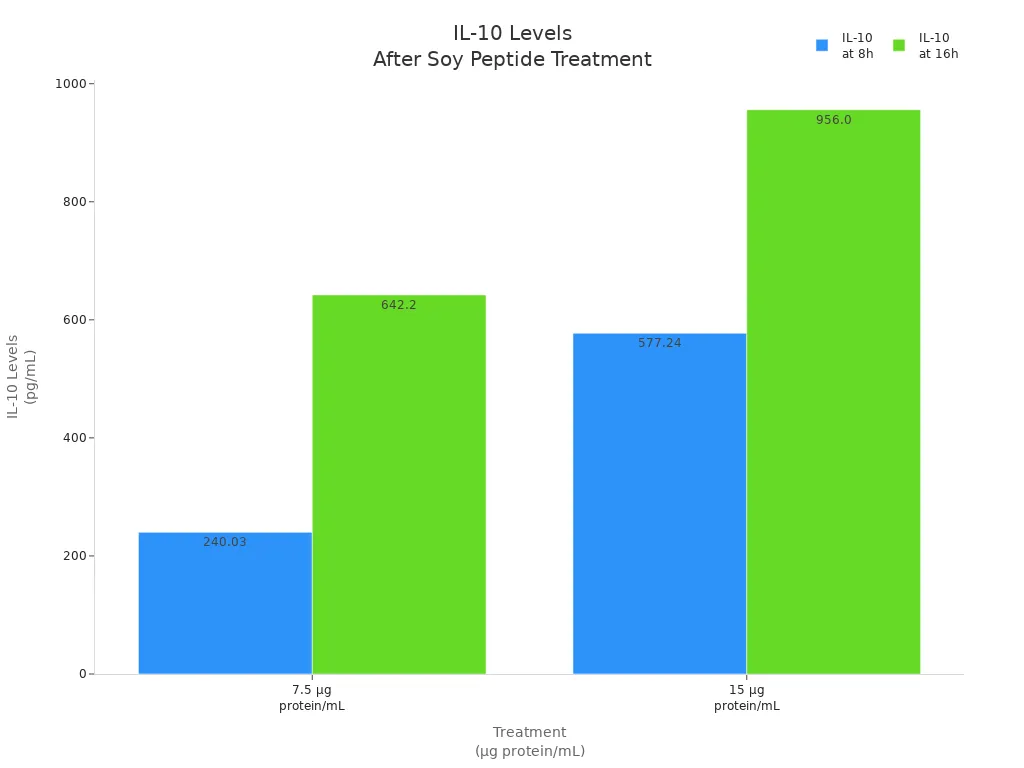
The tables and chart show that higher doses of bioactive peptides raise IL-10. IL-10 is an important anti-inflammatory molecule. These peptides help your body fight inflammation and support your immune system.
Cholesterol-Lowering
Bioactive peptides from soy protein isolate peptides can lower cholesterol. They change how your body handles fats. These peptides help lower LDL cholesterol, which is the “bad” cholesterol.
Study Findings | Effect on LDL Cholesterol | Isoflavone Content | Additional Notes |
|---|---|---|---|
Isolated soy protein with 62 mg isoflavones | Lowered by 10% | 62 mg | Big drop in LDL cholesterol compared to casein |
Isolated soy protein with 37 mg isoflavones | Lowered by 8% | 37 mg | Dose-response effect was clear |
Ethanol-extracted soy protein with 3 mg isoflavones | No big change | 3 mg | No effect on HDL cholesterol or triglycerides |
Ethanol-extracted soy protein with 27 mg isoflavones | No big change | 27 mg | No effect on HDL cholesterol or triglycerides |
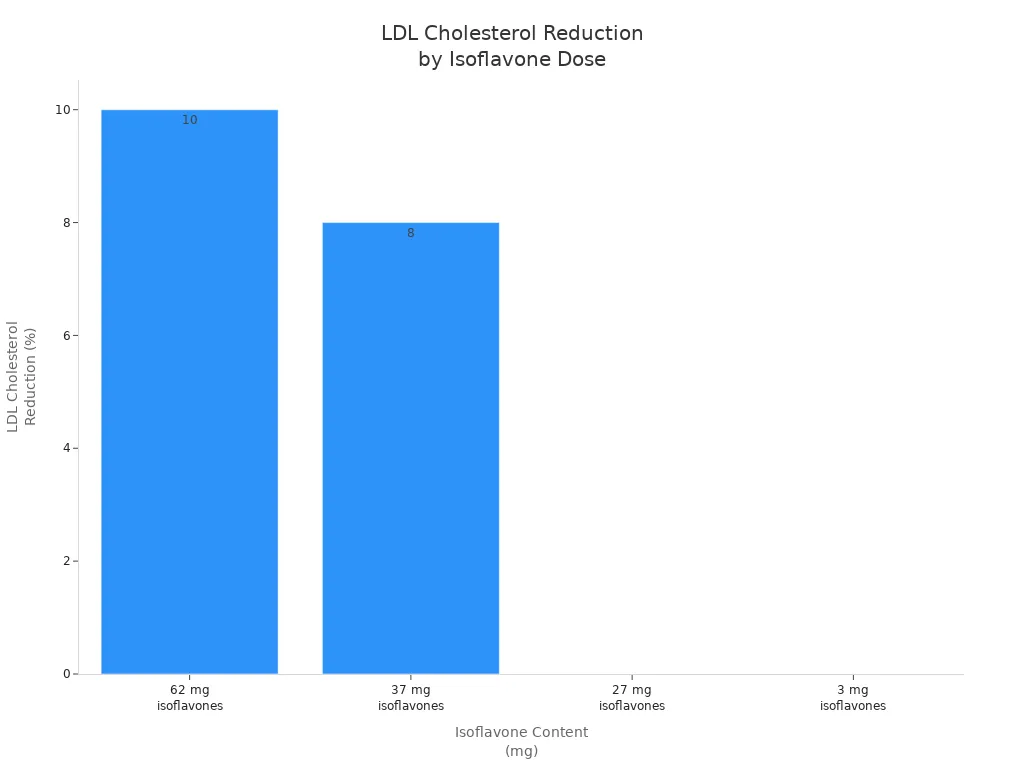
More isoflavones in soy protein isolate peptides lead to bigger drops in LDL cholesterol. This helps your heart and lowers the risk of heart disease.
Other Emerging Benefits
Scientists keep finding new benefits from bioactive peptides in soy protein isolate peptides. Here are some new areas they are studying:
These peptides may lower LDL cholesterol even more.
They could help lower the risk of metabolic diseases.
Some studies show they help the immune system.
Researchers are looking at their anticancer effects.
Their antioxidant properties keep impressing scientists.
You can get these benefits by eating soy-based foods and plant proteins. Bioactive peptides are a safe and natural way to help your health.
Tip: Try adding soy protein isolate peptides to your meals or drinks to help your wellness every day.
Applications
Functional Foods and Beverages
Soy protein isolate peptides are in lots of foods and drinks. These ingredients make products healthier and taste better. You can find them in many popular items at stores.
Snack bars and cereals with extra protein
Shakes and smoothies you can drink right away
Soy milk and yogurt as dairy alternatives
Powders for meal replacements
More people want foods that help them stay healthy. The market for these products is getting bigger every year. By 2035, it could reach $4.40 billion. Liquid and powder forms are liked because you can use them in different ways. Companies keep making new flavors and styles to get more people interested.
Sports Nutrition
If you play sports or work out, soy protein isolate peptides can help you. They help your muscles grow and recover after exercise. Studies show these peptides help you feel less tired during long workouts. Your muscles heal faster, just like with whey protein. Some research found athletes had better immune systems and less muscle damage when using soy protein isolate. This makes soy-based products a good choice for sports nutrition.
Medical Foods
Doctors and dietitians use soy protein isolate peptides in special foods. These foods help people who need more nutrition, like those with heart problems or high cholesterol. Here is a table showing what experts say about soy protein isolate in medical foods:
Source | Findings |
|---|---|
FDA | Studies on soy protein and heart health do not always agree. |
American Heart Association | Soy protein helps a little, but not enough for big changes. |
Jenkins et al (Meta-analysis) | Soy protein lowers cholesterol a bit, but not a lot. |
Soy protein isolate peptides still help people who need special diets, even if the effects are small.
Cosmetics
Soy protein isolate peptides are also in skin and hair care products. Scientists say these peptides are safe for cosmetics. They help make your skin and hair soft and healthy. Companies check for impurities to keep products safe. These cosmetics help with hydration and make your skin and hair feel better.
Tip: Soy protein isolate peptides help companies and people. They add nutrition, make products better, and support health in many ways.
Market Trends
Demand for Plant-Based Ingredients
More people pick plant-based proteins each year. People care more about health and immunity now. This makes companies create new foods. Many families choose vegetarian diets to help animals. Some people have food allergies, so they want plant-based foods. Organic soy protein isolate is getting more popular. People worry about how food is grown. North America and Europe sell the most. Asia-Pacific and Latin America are growing fast.
Trend/Factor | Description |
|---|---|
Consumer Demand | More people want plant-based proteins. |
Health Consciousness | You see new healthy products in stores. |
Vegetarianism | Animal welfare concerns boost soy protein isolate sales. |
Food Allergies | Plant-based choices help people with allergies. |
Organic Products | Organic soy protein isolate is in demand. |
Market Size Projection | Market may reach 2.1 million tonnes by 2035. |
Regional Dominance | North America and Europe lead the way. |
Emerging Markets | Asia-Pacific and Latin America are growing fast. |
The soy protein ingredients market was worth $7.7 billion in 2022. It could grow to $10.8 billion by 2027.
Soy vs. Whey and Collagen Peptides
You may wonder how soy protein isolate peptides compare to others. Whey protein digests fast and helps your immune system. Soy protein isolate digests slower. It gives you nutrients over time and helps immunity. Collagen peptides help immunity too, but there is less proof than for soy or whey. Many people like soy because it is plant-based. It gives steady nutrition.
Whey protein: Digests fast, helps immunity.
Soy protein isolate: Digests slow, steady nutrients, plant-based.
Collagen peptides: Some immune help, less research than soy or whey.
Non-GMO and Clean Label
People want foods with simple ingredients. Clean label foods have fewer additives and clear lists. Non-GMO soy protein isolate is popular. People want natural foods. Companies use fewer chemicals and show what is inside. You see more snacks, sports drinks, and meal shakes with clean labels.
Clean label is more important than chemical additives.
Non-GMO soy protein isolate is a favorite for healthy buyers.
Future Research
Scientists keep working to make soy protein isolate peptides better. You may see new foods with better taste and texture. Researchers want the best protein mix for health. They study how size and solubility change food quality. Future studies may show help for bones, cancer, cholesterol, and diabetes.
Tip: Look for new soy protein isolate foods with better taste and nutrition as research grows.
Bioactive peptides from soy protein isolate help your heart by lowering LDL cholesterol. You can get these peptides in foods like meat substitutes, baked goods, and dairy-free products. Food companies use soy protein because it saves money and works in many recipes. More people want plant-based foods, so the soy protein market is getting bigger. This means you get healthier food and more choices at the store.
Application Area | Benefit |
|---|---|
Meat Products | Makes texture better and easier to slice |
Bakery Products | Adds protein, makes color and smell better |
Dairy Products | Helps mix things well, makes it creamier |
Pet Food | Makes food healthier for pets |
Sweet Foods | Follows clean label rules, replaces other mixers |
Cost Efficiency | Helps companies spend less to make food |
FAQ
What are soy protein isolate peptides?
Soy protein isolate peptides are tiny parts of protein from soybeans. They form when soy protein breaks down. These peptides help your body in different ways. You can find them in foods, drinks, and supplements.
Are soy protein isolate peptides safe to eat?
Yes, eating soy protein isolate peptides is safe for most people. Scientists have checked them in many studies. Most people do not get side effects. If you are allergic to soy, ask your doctor before eating them.
How do you use soy protein isolate peptides in your diet?
You can put soy protein isolate peptides in shakes or smoothies. You can also bake them into snacks or other foods. Many bars and meal replacements have them too. Check food labels to see if they are in the ingredients.
What health benefits do soy protein isolate peptides offer?
Soy protein isolate peptides may help lower blood pressure and cholesterol. They help your immune system and protect your cells. Some studies say they help muscles recover after exercise.
Can you use soy protein isolate peptides if you follow a plant-based diet?
Yes, you can use soy protein isolate peptides if you eat plant-based foods. They come from soybeans, not animals. Many people who are vegan or vegetarian use them for protein.

